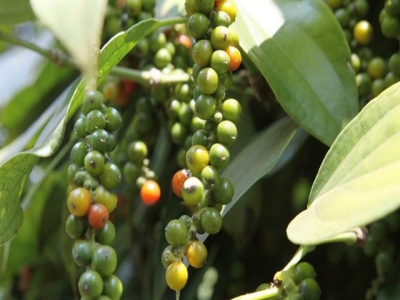MoIT seeks way to help businesses re-export pepper stuck in Nepal

HÀ NỘI — Nearly 60 containers of Vietnamese pepper worth US$3 million have been stuck at the port in Nepal for more than two months.
Pepper is one of key products for export of Việt Nam. -- VNA/VNS Photo
According to Vietnam Pepper Association (VPA), pepper is one of five commodities recently banned from import by the Nepalese Government. However, Vietnamese shipments of pepper had been exported before the effective date of this ban. The situation has not yet been resolved.
Minister of Industry and Trade (MoIT) Trần Tuấn Anh has sent a letter to the Nepalese Ministry of Industry, Commerce and Supplies requesting support for Vietnamese enterprises. In reply, the Nepal ministry said it would support Vietnamese enterprises in accordance with the law.
Meanwhile, representatives of Việt Nam have organised online meetings with the Nepalese side to seek solutions for businesses, in which Việt Nam expects that if Nepal could not import the shipments of pepper, it should help Vietnamese businesses re-export the product.
Under the regulations of the Nepalese Government, the enterprises must have a letter of credit (L/C) opened before March 29. If the enterprises want to re-export pepper, they need to have an application for re-export from the Nepalese importers. However, in fact, in most of the contracts, the Vietnamese enterprises did not get an L/C.
In addition, since Nepal temporarily stopped importing pepper, many importers in Nepal showed no cooperation, not returning legal documents or signing applications for Vietnamese enterprises to conduct re-export procedures. This makes it difficult for Vietnamese enterprises to re-export pepper as expected.
The ministry said that by the start of this month, a few Nepalese importers agreed to sign an application for re-export. However, in order to bring all the goods back as expected, Vietnamese businesses need to coordinate closely with State management agencies and must actively persuade their partners to sign the application for re-export.
From the above case, the MoIT recommends that enterprises engaged in export activities, especially import-export enterprises with South Asia, such as India and Nepal markets, should take measures to prevent risks.
When signing a contract, businesses need to apply international trade conditions such as irrevocable L/C opening, advance deposit, avoid using other risky methods, which will be very difficult to be solved.
Có thể bạn quan tâm
 New rice variety for flood and drought-prone areas
New rice variety for flood and drought-prone areas New rice seed variety which is capable of adapting to climate change has been planted in flood and drought-prone regions in north and south central provinces.
 State needs solutions to reduce logistics cost for farm produce
State needs solutions to reduce logistics cost for farm produce The State should develop solutions to reduce high logistics costs in trading agricultural products to improve the competitiveness of Vietnamese farm produce
 Rice importers try to force prices down, Vietnam needs long-term export plan
Rice importers try to force prices down, Vietnam needs long-term export plan Earlier this month, when Mekong Delta’s farmers were harvesting the 2020 summer-autumn crop, rains and storms affected rice quality and caused the market price